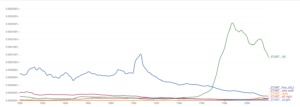tl;dr: No.
But to go into it in more depth: the spelling “alright,” last I checked, is still not accepted by major style guides. I see it used often enough that I suspect it’s inevitably going to become accepted, taking up a similar position to “altogether” (which means something subtly different from “all together”; “I assembled the suspects all together” versus “there were twelve of them altogether”). But it’s not there yet.
It’s definitely not a good idea to use it in historical contexts, where it’s an anachronism; it’s best not to use it at all, in fact, but if you absolutely must, keep it for contemporary. Google Ngram Viewer, which you can use to check how word usage has changed over time, shows it as unheard-of before about 1900, very rare until the 1960s, and gradually gaining usage until 1995, when it starts to increase in popularity more rapidly. It’s still a long way behind “all right”; “all right” was at roughly the same level of popularity in 1860 as “alright” is today, and grew gradually until a peak in about 1945, when it started declining for a while until it swung upwards again around 1980. I’m not sure what replaced it, assuming something did; perhaps things weren’t “all right” for a while after World War II.
The replacement wasn’t “OK”, my first thought, which, though it’s existed since at least 1800, only started a significant upswing in 1967 and equaled “all right” in 1980 (both started going up around then, but “OK” went faster). The variant “okay,” first seen in the late 1930s, overtook “all right” in 2000 and “OK” in 2005, and is today almost twice as common as “all right”, three times as common as “OK”, and ten times as common as “alright” in the written corpus Google Ngram Viewer draws on (a large number of scanned books and other written material published between 1800 and 2019).
“All right” wasn’t replaced by “fine” either. After some ups and downs in the 19th century, “fine” shows a dip from 1905 to 1918 (understandable), followed by a rise until 1925, then a fairly steady decline from 1925 to 1995, when it starts an upswing more or less parallel to “okay”. Of course, “fine” means several other things apart from what “OK” or “all right” mean, even if you restrict your search to the adjective (which you can do in Ngram Viewer by searching for “fine_ADJ”).
I checked thesaurus.com for other alternatives and found “very well,” which, of course, can also be used in phrases like “she did that very well” (which isn’t what we’re after, but I’m not sure how you’d eliminate it from the search). “Very well” has been in relatively stable usage since 1800.
If we restrict the usage to the start of the sentence (using the _START_ tag before each word), we get a slightly different picture. This will reduce (though not eliminate) the other usages of “fine” such as “fine furniture” and bring it more into line with the usage of the other words: “All right, let’s see what we have here.”
Here we see that “fine” at the start of a sentence has a big peak in 1925, after which it slowly declines, crossing “OK” on its way up in 1969. “OK” peaked in 1986 and started declining, with no other words seemingly replacing it. Presumably, people weren’t starting their sentences with a filler word meaning “all right” to the same extent.
Another way to home in on the usage I’m interested in is to make it part of a phrase, such as “that’s okay/OK/fine/all right/alright”. (I left out “very well” because “that’s very well” is not a phrase people use.) The picture is pretty similar:
So, if your story is set any time between 1800 and about 1980, go with “all right”; it’s always correct, and it’s something that people of that time period were much more likely to say than most of the alternatives. If they’re a more high-flown speaker, “very well” is a good choice in some contexts. “OK” or “okay” are best used after about 1970, though they did exist earlier (please don’t use “ok,” because when you capitalize the first letter but not the second at the start of a sentence it looks like the speaker is an orangutan with a speech impediment). But avoid using “alright” except possibly in contemporary or future settings, and even then, I’d advise against it.


